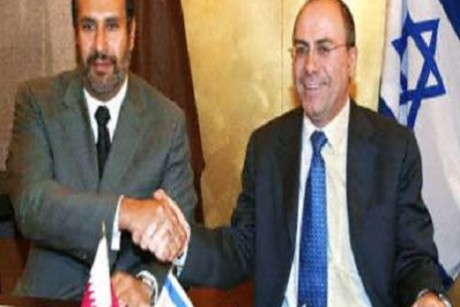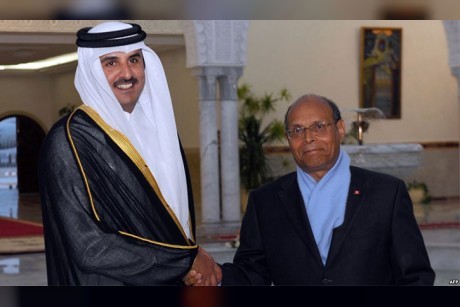In 1991, former emir Khalifa bin Hamad al-Thani expressed his support for the Arab-Israeli peace conference in Madrid, engaging Qatar in bilateral relations with the state of Israel. His successor, Hamad Bin Khalifa was present at the signing ceremony of the ’Oslo 2’ agreement in 1995 between the Israelis and the Palestinians , giving his support to the peace process.
This political support initiated several trade ventures between Qatar and Israel, leading to a warming of relations between the two countries. Qatar became the first Gulf Cooperation Council (GCC) state to grant Israel de facto recognition, when the first Israeli trade office in the GCC opened in Doha, following a visit by the Israeli prime minister Shimon Peres in 1996.
The election of Benyamin Netanyahu as Israeli prime minister, followed by the opening of the Western Wall tunnel in 1996, caused a significant deterioration in relations with Qatar. Yet, despite the Arab-Israeli peace process being stalled at the time, Qatar hosted the Israeli trade minister at the fourth annual Middle East and North Africa Economic Summit in Doha, in 1997, which caused Arab outrage; Saudi Arabia called the move threatening to ‘the higher interest of the Arab Nation’.
The pressure on Qatar to freeze its ties with Israel grew as the peace process was stagnating, and Israeli violations of the Oslo Accords made the Qatari government uneasy in justifying their mutual trade relations with Israel. The first signs of distance between the two partners emerged and continued with the outbreak of the al-Aqsa Intifada in 2000. The Qatari authorities expressed their criticism of the state of Israel and subsequently turned down Ehud Barak’s request to visit the country. Hamad eventually met Barak at the UN Millennium Summit in September 2000.
As Doha was hosting the Organization of the Islamic Conference (OIC) meeting in November 2000, Qatar’s continuing engagement with the Israelis caused a major political row with Saudi Arabia, Iran, and other states. Qatar dismissed calls from the chair of the OIC to close the Israeli trade office. Eventually, however, the country gave in to regional pressures and announced the closure of the Israeli office in Doha on 9 November 2000. Further secret meetings between the two states did, however, take place, and the unofficial cooperation continued, according to Matthew Machowski, research fellow at Queen Mary University of London.
As Qatar’s diplomatic ambitions to become a regional player grew, it repeatedly offered to broker peace between Israel and the Arab states. In 2003, the Qatari and Israeli foreign ministers, Hamad bin Jassim al-Thani and Silvan Shalom, met in Paris to discuss ways of forging a Middle East peace. In May 2003, Sheikh Hamad stated that ‘Qatar could consider a peace treaty with Israel if it served the Gulf state’s interests’. In 2005, as a positive step towards Israel’s disengagement from Gaza, Hamad met with Israeli foreign minister Tzipi Livni on the sidelines of the UN meeting in New York.
In April 2008, Israeli Foreign Minister Livni visited Qatar on her first trip to the Gulf region. Invited by the former emir, Livni held many meetings, including one with the emir. Qatar was criticized widely for this by its neighbours, but Israel prizes it in a region of many resistance movements and governments who refuse to talk to Israel as long as the occupation of Palestinian lands continues.
The relationship between the two countries reached a turning point in December 2008, when Israel attacked the Gaza Strip, in what the Qatari prime minister and foreign minister, Hamad bin Jassim al-Thani, called ‘the flagrant savage aggression against the Palestinian people’. Qatar disengaged from all ties with Israel, shut down the trade office, and expelled all Israeli representatives.
However, Qatar had offered to assist in brokering a cease-fire between Hamas and Israel in early 2009. The Qatari leader passed on the message through an Israeli Knesset member (of the progressive leftist party, Meretz) and the former foreign minister, Yossi Beilin. The two had met in Qatar at a meeting for former foreign ministers.
Qatar will continue its dialogue with Israel for strategic and economic reasons. Qatar’s relations with Israel are meant to strengthen its ties with the West, including the United States , and Qatar hopes that economic ties with Israel will lead to sales of its plentiful natural gas.



